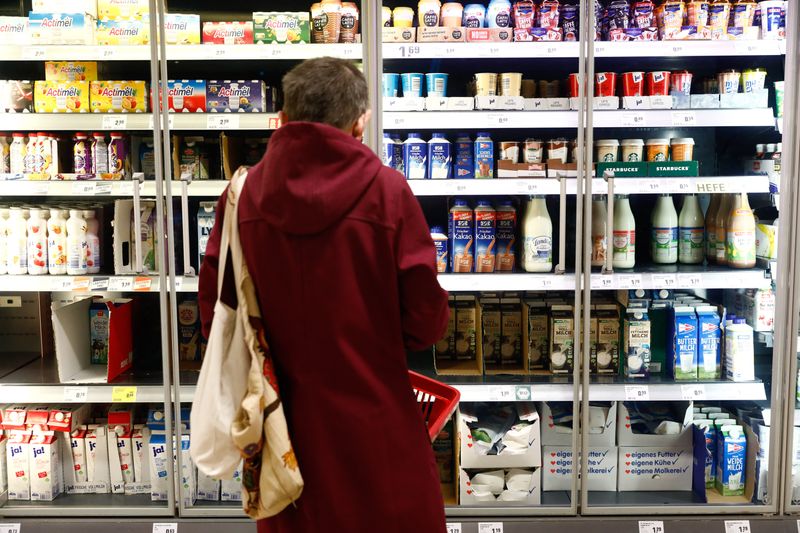By Maria Martinez
BERLIN (Reuters) -German annual inflation remained flat in November despite expectations of a second consecutive increase, breaking a downward trend in Europe's troubled largest economy.
Inflation stayed at 2.4%, the federal statistics office said on Thursday.
Analysts polled by Reuters had expected a reading of 2.6% this month, after German consumer prices, harmonised to compare with other European Union countries, had risen by 2.4% year-on-year in October.
Core inflation, which excludes volatile food and energy prices, was at 3.0% in November up from 2.9% in the previous month.
Energy prices fell by 3.7% compared with the previous year, while food prices rose by 1.8% year-on-year in November, data from the statistics office showed.
The stickiness of inflation at slightly too high a level looks set to continue as favourable energy base effects will continue to peter out while wages increase, said Carsten Brzeski, global head of macro at ING.
However, with the current turning of the labour market, Brzeski said wage growth should come down more significantly than previously thought, leading to more disinflationary pressures next year.
ING expects inflation to remain within the broad range of between 2% and 2.5% in 2025.
Higher food prices are keeping inflation uncomfortably high ahead of a federal election on Feb. 23, causing uncertainty among consumers, said Friedrich Heinemann from the ZEW economic institute.
"In the U.S., inflation has already played into the hands of a populist candidate," Heinemann said. "Similar effects are not to be ruled out for Germany."
ECB WATCHING
The German data came ahead of the euro zone inflation release on Friday. Harmonised inflation in the euro zone is expected to rise to 2.3% in November from 2.0% the previous month, according to economists polled by Reuters.
Investors are watching the inflation data for Germany and the euro zone as a whole to gauge the next steps of the European Central Bank.
The ECB is expected to cut interest rates further at its upcoming meetings, but the scale and speed of that course is unclear.
Underlying inflation is still high and trade policies of the new U.S. administration could prove inflationary, Bundesbank President Joachim Nagel said on Monday.
Still, he added that the ECB is increasingly confident it will hit its 2% inflation target next year.
Elsewhere, headline HICP inflation rose in Spain from 1.8% to 2.4% but core inflation edged down from 2.5% to 2.4%. Headline inflation also rose in Ireland and Belgium, but in both cases the core measures fell.

Andrew Kenningham, chief Europe economist at Capital Economics, said there is a strong case for the ECB to cut interest rates in December by 50 basis points rather than 25 given the dwindling risks of inflation flaring up again and the growing risks of prolonged stagnation.
"However, policymaker comments suggest the bar to faster rate cuts is high," Kenningham said.